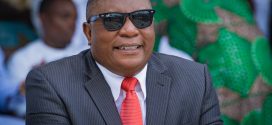7
Although today is only scheduled for the inauguration of the reconstituted board of the Rural Electrification Agency, I feel obliged to make a few comments that I believe shed some light on the plan of the Buhari Administration on our understanding of the purpose and role of this agency.
Before I do so, let me express the gratitude of the Federal Government of Nigeria to the immediate past acting Managing Director and his team and all those who have served in this agency since its inception, for their service and contribution.
It is my expectation that the new team will be able to build on whatever you have left behind, improve on it and ultimately achieve the purpose for which this agency was set up, which is to provide access to electricity for millions of Nigerians who are yet to be connected to the grid.
Although it is called a ‘Rural’ Electrification Agency, there are many urban and suburban communities that still lack access to power because they have not been connected to the national grid.
Part of the reason for this lack of access is that the 330/132 KV and 132/33 KV lines (popularly called the high-tension wires), by which this connection is often made, run over long distances covering several hundreds of kilometers.
The cost of extending these lines to communities is expensive and where the population in such communities is not large, the price of their electricity will be high because it will be borne by a few people.
Because public tariff is fixed, investments in these lines are not considered attractive and it is easy to pass over these communities or simply attempt grid extensions which have not covered the field and have resulted in many people being left behind.
All of this is about to change and that is why we are here. REA is the champion of these unconnected communities, who have have been left unserved. REA will bring them to mainstream of electricity connectivity by providing and promoting off grid connections.
Let me point out that when the Electricity Sector Reform Act was passed in 2005, it set up the Rural Electrification Agency and mandated that the Rural Electrification Implementation plan should be prepared (within a year) for Presidential Approval.
It is that plan that will set out how to reach the unconnected communities that I spoke about, through a combination of grid extension and development of independent grids, using new technology such as solar, which will mitigate the cost of the long 330/132 KV and 132/33 KV lines which I spoke about.
Unfortunately, nothing was done between 2005 and 2016 about the Rural Electrification Implementation program until 2016 when President Buhari approved this plan. That was a period of inaction of 11 (ELEVEN) years.
Thankfully, all that is behind us. We must look to tomorrow and the promise of increased access to electricity that President Buhari’s approval heralds.
The anchors for implementing Rural Access are:
- Completion of over 2000 Grid extension projects that started life as constituency projects since 1999 but have now either been abandoned or uncompleted;
- Resuscitation of 6 (SIX) small Hydro dams and activation of their power component, which have received Federal Executive Council (FEC) approval, have been advertised, and we have received Expressions of Interest which we are evaluating.
- Development of Independent Power Plants in 37 (THIRTY-SEVEN) federal universities and seven teaching hospitals in rural areas and the building of independent power grids from there to connect adjoining rural and unconnected communities.
Most of these IPPs, at least 27 (TWENTY-SEVEN), will be solar powered and this is the heart of the matter.
This is because President Buhari understands the increasing emergence of renewable energy sources, like solar power from the fringes of the energy debate to the mainstream.
This is why he was one of the first leaders to append his signature on behalf of Nigeria to the Paris agreement.
Most importantly he understands the appeal of renewables generally and Solar in particular to the global youth population and Nigeria’s youth.
He understands how impactful a small solar plant can be to a barber, hairdresser, small food processing plant and small businesses generally where our youth are participating in making their contribution to our national development.
He understands and appreciates the role that young people played in building the nation and driving the economy.
This is why he has appointed young people to the leadership and management of this agency, to deliver not only on the promise of their generation but also on the expectation of millions of unconnected people who are living without electricity.
This is why he has constituted a Board of Experience and Youth in this critical agency.
I hope and expect that all of us will rally round and support this new team to deliver on their mandate.
On behalf of the Ministry of Power, Works and Housing, I promise our fullest support.
It is therefore with pleasure that I formally inaugurate the Board of the Rural Electrification Agency and wish them success in the implementation of the Rural Implementation program.
Babatunde Raji Fashola, SAN
Honourable Minister of Power, Works and Housing
 Hottestgistnaija.com
Hottestgistnaija.com




